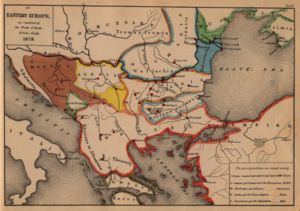 Disraeli again, I am afraid (there will be postings about Peel and others, I promise), as today is the anniversary of the signing of the Treaty of Berlin, the ending of the month-long Congress of Berlin in 1878.
Disraeli again, I am afraid (there will be postings about Peel and others, I promise), as today is the anniversary of the signing of the Treaty of Berlin, the ending of the month-long Congress of Berlin in 1878.
“The treaty recognised the complete independence of the principalities of Romania, Serbia and Montenegro and the autonomy of Bulgaria, though the latter remained under formal Ottoman overlordship and was divided between the two principalities of Bulgaria proper and Eastern Rumelia, undoing Russian plans for an independent "Greater Bulgaria". The Ottoman province of Bosnia-Herzegovina as well as the former Sanjak of Novi Pazar were placed under Austro-Hungarian occupation, though formally remaining a part of the Ottoman Empire.”One could argue that the treaty launched many of the problems that culminated in the First World War and the subsequent unstable peace treaties but that would be a little unfair to the Earl of Beaconsfield whose negotiating skills elicited Bismarck’s admiring comment: “Der alte Jude, das ist der Mann.”
It is rather reassuring to think that towards the end of the last century many of those names reappeared in our consciousness as countries that had apparently ceased to exist made their way back into history.
Right: Not fair to blame Disraeli for the downstream consequences of the deal cut at Berlin. It was up to later statesmen to navigate their own rapids, and they failed. Had there been a Disraeli and a Bismarck around in 1914 I think they would have managed to defuse the situation. There was practically no adult supervision going on in Germany anyway at that point.
Montenegro's reappearance may have large effects. The detachment of a province which then becomes an independent state recognized by other states without a mumble is something the Chinese are apparently terribly upset about. The Chinese were strongly pro-Serb during the recent troubles because, in part, they wanted to prevent the creation of any such precedent. This very good post about Montenegro from Coming Anarch is worth looking at.
I agree with Lexington. As long as Bismarck was around, Germany set realistic bounds to her ambitions. The kaiser and those who encouraged him did not. Not sure how Disraeli would have coped, but suspect that if there are long-term origins of the First World War, they are to be found in the failure of the Kremsier constitution and the Russian defeat by the Japanese.
Whether the revival of small nationalist entities is a help or hindrance to peace is splendidly debatable, but I can see where the Chinese are coming from and why? Stalin and Tito were of like mind.
Oh I wouldn't argue with the notion that Bismarck and Disraeli would have sorted out those pesky Balkans. It was a Bosnian Serb who caused all the trouble and, being under age, was not even executed. How different from those splendid chaps who ran Yugoslavia and the Soviet Union afterwards.
There was never any particular reason why Montenegro should remain part of Serbia once the rest of Yugoslavia fell apart, which happened through the nineties considerably more bloodily than necessary precisely because so many Europeans supported the curious idea of the big unit being kept together. Tyrants have never liked national self-determination and modern totalitarian leaders have hated it even more. So yes, we can all see where Stalin, Hitler, Mao, the present Chinese leadership, Tito et al are coming from.
Dear toryhistorian, my heart is with you, but my head has doubts about some of the consequences of nationalism. That said, no one can defend Lenin, Stalin, or Tito for that matter.